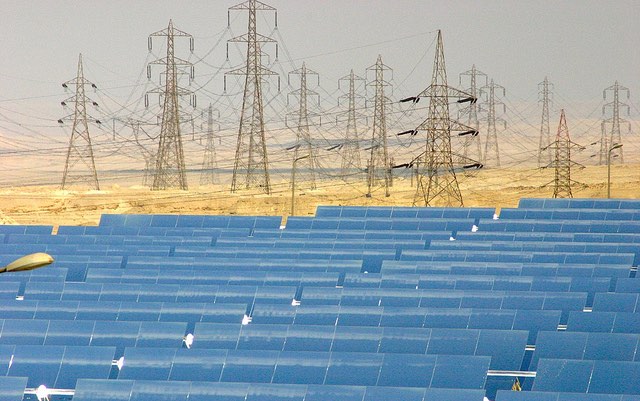In Egypt, like everywhere, growing energy demand is increasingly at odds with the urgent need to control carbon emissions.
Nationally, energy use is rising approximately 6.5 percent a year. To keep up, the government has promoted growth in production of natural gas and other conventional energy sources. As gas production has risen, the share of renewable energy sources in power generation has shrunk. This strategy raises concerns about the country’s finite gas reserves, and also throws Egypt off track in meeting the goals laid out in its sustainable development plan, Egypt Vision 2030. The country faces the potential double whammy of long-term energy insecurity and environmental vulnerability.
Egypt is starting to grapple with this problem, seeing the lack of diversity in its energy mix as an opportunity for improving energy security, expanding household access to electricity, and moving away from the destructive impacts of burning fossil fuels. But how can Egypt’s growing energy demand be balanced with its sustainable development goals?
New research outlines ways in which Egypt’s energy sector can diversify as it expands, moving away from natural gas in favor of renewable energy sources and efficiency improvements. This research uses the innovative TIMES energy system model to assess five different scenarios Egypt could pursue to meet its future energy needs. Two of these scenarios project the impact of targeting specific levels of power generated from renewable sources, one assesses a strategy explicitly targeting reductions in carbon emissions, and one examines the impact of constraining growth in the use of natural gas for power generation. The last is a reference scenario with no policy changes.
To secure a more sustainable energy future, Egypt’s best path forward is to follow the global movement toward reducing fossil fuel consumption and adopting a more efficient energy portfolio heavy on renewable sources. That could help reduce Egypt’s dependence on fossil fuels to as low as 42 percent by 2050 (in a scenario in which 40 percent of electricity is then generated by renewables), the study shows, compared to 90 percent under business-as-usual.
The country’s abundant sunlight and wind, in particular, could provide a continuous supply of electricity to an increasingly energy-intensive residential sector. Egypt has a largely untapped solar photovoltaic generation capacity of 74,000 TWh each year. Meanwhile, areas including the Gulf of Elzait, Owaynat, and Sinai have great potential for wind power projects. Concentrated solar generation and hydropower are further options for a new, diverse energy mix. The right mix of any of the above could meet Egypt’s growing demand for energy, and reduce its contributions to climate change.
As Egypt fulfills its plan to interconnect with regional and international electricity networks by 2020, bringing more renewable energy sources onto the grid can be a statement of commitment to equitable, sustainable development, the study suggests. Moving Egypt toward a “green economy” with the development of renewable energy will also help policy makers to meet existing climate commitments. Diversification can also be accomplished without imposing significant energy costs; as renewable technologies continue to develop at breakneck speed, introducing wind and solar projects should be reasonably cost-competitive with conventional energy in the long term.
As Egypt continues to grow, its energy supply must keep pace. But the country must do more than merely keeping up with demand. Egypt must secure its long-term energy security and also find ways to reduce its carbon footprint. The evidence shows both these goals can be met—and that the efforts can reinforce one another.
Alam Hossain Mondal, a former IFPRI Research Fellow, is an Associate Professor in the Department of Electrical and Electronic Engineering at Daffodil International University in Dhaka, Bangladesh. Claudia Ringler is Deputy Director of IFPRI’s Environment and Production Technology Division (EPTD).







